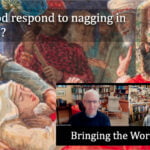 I recently preached at another local church, and a member of the congregation there is running a project to encourage prayer. He has recorded a range of leaders talking about prayer, and incorporated this into a website which includes a course on prayer making use of Richard Foster’s book Prayer: finding the heart’s true home.
I recently preached at another local church, and a member of the congregation there is running a project to encourage prayer. He has recorded a range of leaders talking about prayer, and incorporated this into a website which includes a course on prayer making use of Richard Foster’s book Prayer: finding the heart’s true home.
Find below my video, which lasts seven minutes. For me, prayer is about entering into and dwelling in God’s presence, which on the one hand means rest and refreshment (‘Our hearts are restless until we find our rest in thee’, Augustine), but also means repentance and longing—repentance because we fall so far short of God’s perfection, and longing to see God’s broken world transformed by his kingdom.
The two halves of the Lord’s prayer match these concerns. As we enter our Father’s presence, we long to see his name honoured, his will done and his kingdom come. But we know our own inadequacies, so also need his protection from evil, defence against temptation, and the provision of our daily bread ‘for the coming day’.




























Thanks, Ian – wise, helpful words.
Oh how to comment on a post like this one without coming across as dismissive, mocking and/or arrogant?
It’s hard for an atheist (technically an agnostic, although in practice I think it so unlikely that God exists, atheist seems a more honest description) to approach the subject of prayer without causing intense irritation to those who believe in its efficacy. But I’ll try…
My own experience of prayer is not extensive, although on the recommendation of Christian friends, I am currently trying the “covering all my bases” kind of prayer, which usually begins with “dear God, I don’t really believe you exist, but just in case I’m wrong, ….”
Neither at these points nor at any other have I ever felt a sensation of being in God’s presence. No “numinous” glowing feeling envelops me. Indeed I feel vaguely ridiculous, although fully justified, because of course my skepticism could be mistaken and God could be there. If he is though, then he doesn’t seem interested in giving away any clues of his presence.
Perhaps part of the problem is my general incomprehension of what prayer is actually for. Why does an omnipotent and omniscient being want my worship? What’s with worship anyway? Doesn’t God’s desire for it mark him out as self-obsessed, to say the least? And if I’m supposed to pray for his kingdom to come, yet when it does, as a gay man I’ll be forced into eternal celibacy (unless I just go straight to hell of course), why would I want to pray for something I quite frankly do not want to happen?
So reciting the Lord’s prayer seems pretty counterproductive. In effect I’d be saying “Dear Lord, please hasten the day when existence becomes intolerable for me.” Would you do it?
Petitioning prayer seems just as pointless. I’m pretty sure God won’t give me anything I particularly want. Nor will he grant me anything I pray for for others. Israel is still surrounded by enemies despite me including it in my prayers for some time now. Poor France (lamented be she!) still has the most incompetent president ever elected. My quartier of Paris is still full of blind drunk, vomiting British tourists every weekend (it’s all hosed into the Seine every Sunday morning and you can tell because the fish rise belly up to the surface…) And finally, my dear friend Marie-Adélaïde is still stubbornly single and suffering from terrible loneliness and purposelessness as a result. So neither her prayers nor mine seem to be doing any good, and as she’s almost certainly France’s most devout Roman Catholic (she spends more time on her knees than most charwomen) you’d have thought there might have been some movement by now…
So I just don’t see the point of prayer. God, if he exists, knows how wonderful he is, so why does he need me to tell him? Especially when I’m not convinced he’s quite as amazing as he claims to be, if he exists at all. And if my petitions are never to be answered, why waste my breath praying them?
Perhaps God just isn’t interested in the prayers of an infidel and nothing will happen until I start to believe. But belief can’t be switched on like a light switch. And even when it’s present, I haven’t noticed that it makes prayers come true. Marie-Adélaïde stands as a pretty convincing witness to God’s unwillingness to answer the prayers of even his most faithful servants.
So why pray? Is it just part of the ritual or does it have real meaning?
Prayer is about relationship with the living God. It might take its form as ritual, as might any relationship (all relationships are ritualised to one degree or another.)
So, no, prayer is not just a ritual. If you do not have a relationship with the living God then I can quite understand that prayer does not make sense.
Well that’s something else I don’t understand. If Christ was fully God and fully human and was crucified and died and then rose from the dead 2000 years ago, how can he still be alive? Humans just don’t live that long, not even the Biblical patriarchs lived for more than a thousand years.
It seems to me that a lifespan of 2000 years plus makes Christ superhuman rather than human. To be fully human you surely have to be conscious of your limited lifespan and the uncertainty of what lies beyond. You have to rely on faith that something better (or worse) awaits you, or faith that death is followed by oblivion. The moment you have certain knowledge is the moment you stop being human as we know it.
Perhaps Christ is human as originally intended by God before his work was marred by the Fall, but how can that be when he knows everything and humans were essentially ignorant before the Fall? Doesn’t this empty his incarnation and subsequent sacrifice of meaning? How can Christ, the perfect superman, have suffered like a human when he had certain knowledge of the outcome of the crucifixion? I know he’s supposed to have wondered out loud why God had abandoned him, but I’ve always read that as “can we cut this short please?” rather than “are you really there?” There can have been no true doubt in that cry without depriving Christ of omniscience, which of course deprives him of divinity. So the crucifixion for him must have been a bit like root canal work for us: it hurts like billy-o but you can bear it because you know the pain won’t last very long.
Crucify a man and you put him through suffering that even the strongest faith cannot guarantee will end in bliss. Crucify God and you really just put a crimp in his day. That being the case, I can’t see the value of the crucifixion or its relevance to us. How does the finite and limited suffering experienced by an omniscient being make him fully human when our suffering is far more infinite because it’s always accompanied by doubt and ignorance? How can sure knowledge ever suffer as much as fearful ignorance? How can Christ claim to be human when death is meaningless to him and he can never have experienced the doubt and fear that darken our lives?
It’s this lack of commonality with God that makes him seem so very remote, unreal and unfeasible, I think. Perfection isn’t something humans can easily relate to. It can certainly attract us, but not in a way we can truly connect with because it’s just so inhuman. Personally I find the idea of perfection rather dull. The perfectly symmetrical and balanced façade on a classical château isn’t half as interesting as a flawed and haphazard medieval construction. It’s the bad along with the good that gives buildings (and humans) character and spice. The Kingdom sounds like it’s going to be a very dull place indeed. Without our imperfections, what will we be? Anything but human, it seems to me.
Etienne: such a cavalcade of questions and most or all of them are fair in their own way. I don’t have the time or ability to respond to them in a blog post but can only suggest 2 or 3 books where these questions are indeed engaged with. The best (at least stylistically) is Chesterton’s ‘The Everlasting Man’; then Lewis’s ‘Mere Christianity’ on the Incarnation (there’s a great summary of this on youtube); and Packer’s ‘Knowing God has chapters on the meaning of the Cross for Christ. There are more modern treatments (e.g. Tim Keller) that may resonate better today. As for the ‘dullness’ of perfection, maybe the thinking here is too static, as if everything has been said and experienced.
Is it real or illusory that human beings have a sense of the infinite – and that the infinite does exist, at least conceptually? I mean things like irrational numbers, pi, the square root of 2 and such like: things we can conceive of put never finally calculate? Christians believe the sense of eternity has been placed by God in our hearts or minds: a signal of transcendence among several that we are made in the image of God and intended for relationship with Him.
Hi Ian,
I just realised I don’t subscribe to you emails – I will do after writing this response.
I have a question – will this blog be emailed , including your video?
I’d like to forward it to some of my non-Twitter friends.
Thank you!
Christine
Hi Ian,
I received your email this morning and was able to forward it to a non-Twitter friend! 🙂
Thank you.
Thanks Ian Paul for the video.
Tomorrow I am visiting a church where it is almost certain that they will ask us to pray for each other and I was just thinking today, how shall I do it more effectively than last time and then I came across your blog.
Wonderful!